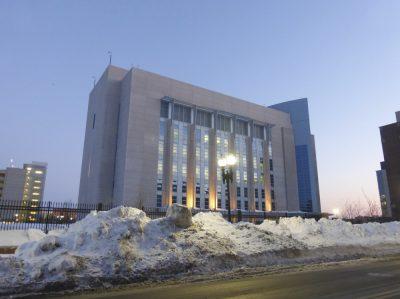
A recent study by Boston University researchers has found that signs of the Ebola virus can be detected days before symptoms appear, potentially allowing the disease to be diagnosed even earlier than before.
BU professor of microbiology John Connor, who worked on the study, said he and fellow researcher and BU doctoral candidate Emily Speranza worked with researchers from the U.S. Army Medical Research Institute of Infectious Diseases to study the immune cells of 12 monkeys who were exposed to the Ebola virus.
The study, published on Wednesday, found that the presence of the Ebola virus can trigger a detectable immune response in monkeys four days before they start exhibiting symptoms.
People who have been exposed to Ebola currently cannot be diagnosed until they contract a fever, but Connor said that these symptoms don’t appear until the virus has already had a chance to replicate and escape into the bloodstream.
“It would be really nice to be able to catch the infection before you’ve had that much virus replication going on,” Connor said, “and ideally before the person starts showing overt symptoms.”
With further research, Connor said, doctors could have the potential to track exposed individuals’ immune systems to get an early start on treatment.
“If you had an asset that gave you advanced warning of that, you could start quarantine [and] treatment early,” Connor said, “and probably slow down outbreaks and make them not nearly as harmful as the last one we saw.”
These findings could be particularly useful for identifying the disease in doctors working in the field, or for those who come into close contact with infected individuals.
It is currently impossible to find out if the same immune response occurs in humans, Connor said, as the Ebola outbreak that began in Western Africa in 2014 is now over. However, he said if another outbreak should occur, scientists should collect blood samples from those affected to inspect them for signatures of future infections.
Connor and Speranza work at BU’s National Emerging Infectious Diseases Laboratory. NEIDL director Ronald Corley wrote in an email that the lab “provides an intellectual environment” that “supports faculty and research staff to do innovative science using multidisciplinary approaches.”
“This work is exactly the rationale for why the NEIDL was built,” Corley wrote, referring to the study.
Starting treatment as early as possible is crucial to improving the prognosis for individuals with acute diseases like Ebola, Corley wrote.
“The earlier medical interventions can be undertaken, the more likely the patient is to survive with controllable disease,” Corley wrote.
The study also opens up many doors for new research on the issue of disease detection.
“There are many new avenues of study suggested by this work,” Corley wrote. “Are there additional gene sets not yet investigated that give a virus specific signature at an early time? Could amplifying the earliest response have a protective impact on disease course?”
The antiviral response signature found in the study could occur for other diseases as well, Connor said, such as dengue fever or chikungunya.
“You could imagine this being very useful for a large number of viruses,” Connor said, “in order to try to get early, actionable information on future infections.”
Connor said researchers at Duke University have noticed a similar phenomenon occurring in influenza patients.
Corley wrote that though it is still too early to diagnose infected, but asymptomatic, individuals, the study still provides useful insight for the future.
“One could begin to think of approaches to develop new tools that could, over time, be taken into outbreak areas to screen contacts of Ebola cases,” Corley wrote. “More work to do!”
Jennifer Small is a junior in the Boston University College of Communication, majoring in journalism and minoring in media science. She is one of the Co-Campus News Editors for Spring 2023.










